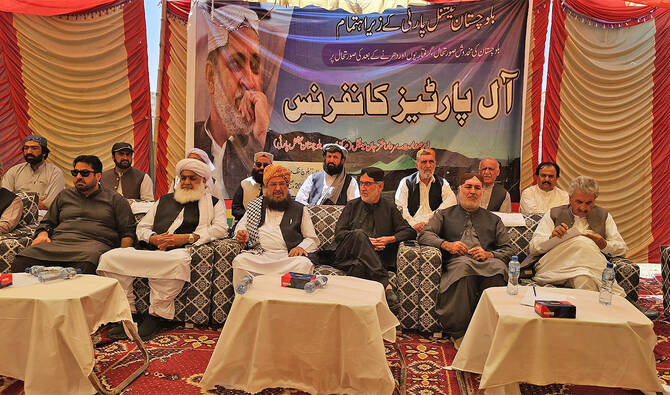ISLAMABAD: The Balochistan National Party-Mengal (BNP-M) on Wednesday called off a weeks-long sit-in in southwest Pakistan against the arrest last month of Baloch ethnic rights activists, the chief of the party said in a press conference.
BNP chief Sardar Akhtar Mengal and his supporters have been leading a protest since Mar. 28, days after Dr. Mahrang Baloch, the most prominent rights activist from Balochistan, and others were arrested after they took part in a protest outside the University of Balochistan in the provincial capital of Quetta. Baloch and other activists had been demanding the release of other members of the Baloch Yakjehti Committee rights group, whom they allege have been detained by security agencies.
That demonstration ended in the death of three protesters, according to police documents, and Baloch and others were charged with terrorism, sedition, and murder. The Pakistan army and government have in the past variously referred to Baloch and her BYC as ‘terrorist proxies’ who are allied with militant separatist groups like the Balochistan Liberation Army (BLA). The group denies the charge and says it leads peaceful protests for the rights of the Baloch.
“Keeping in mind everything, giving importance to the difficulties of the people, the Balochistan National Party has decided that if the government does not allow us to go to Quetta, we will continue our protest, if not this way, then any other way we deem fit,” Mengal Said at a press conference in Mastung where his party had been holding the sit-in.
He did not elaborate on a future course of action.
The crackdown on BYC leaders followed a deadly train attack in Balochistan last month, in which BLA separatist militants took hundreds of passengers hostage. The army said 23 soldiers, three railway employees and five passengers had died in the attack and rescue mission, which lasted over a day.
Last year, Baloch was barred from traveling to the United States to attend a TIME magazine awards gala after being named on the 2024 TIME100 Next list of “rising leaders.”
She began her activist career at the age of 16 in 2009 when her father went missing in an alleged “enforced disappearance.” His body was found two years later. Her BYC says it campaigns against such extrajudicial killings, abductions and other rights abuses against the ethnic Baloch people. The state denies official complicity.
Protests and advocacy among the Baloch are often led by women, who say their male counterparts have suffered the worst in a decades-long state crackdown.
Pakistan has been battling a separatist insurgency in Balochistan for decades, where militants target state forces and foreign nationals in the mineral-rich southwestern province bordering Afghanistan and Iran.












